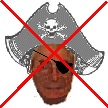



| |
Section 1 --- Licence Conditions and Station Identification
Messages
1C1 Q3 Recall the requirement to send
messages only to other amateurs.
The Licensee shall only address Messages to other Amateurs or to the stations of those Amateurs.
A "Message" means a signal which conveys information to or from Radio Equipment operated by an Amateur in accordance with a United Kingdom Amateur Radio Licence;

All non amateur radio licence holders who gain access to the amateur bands are considered as pirates. Do not speak to them but should you inadvertently come across one don't be the policeman of the bands - just ignore and stop the conversation.
Should you be called by a station in response to your CQ call and that other station fails to give a callsign when asked then break off the contact and assume that they were a pirate.
The Licensee shall be permitted to use the Radio Equipment to discuss any topics of mutual interest with other Amateurs, and to seek to receive and impart any information and any ideas.
The items that you talk about must be personal to you or be of a technical nature. You will often hear stations telling each other about their equipment especially their rigs and antennas.
Broadcasting means talking to anybody who happens to be listening. It also usually linked to that fact you would not be expecting a response.
Thus calling CQ is not Broadcasting as you are very much wanting a reply.
Talking on
amateur radio frequencies as if you were a radio station for general
reception of those listening is not permitted.
1C1
Q3 Recall that a 'Net' or 'Network' refers to a conversation with
several amateurs with whom communication and identification has been
established.
This is where you
are in conversation with more than one person and there is usually a NET
CONTROLLER who will bring you into the conversation for you to be able
to add your comments to the topic being discussed. You can join a net at
the beginning when the NET CONTROLLER make a general invite such as
calling CQ or you can call in with just your call sign during breaks or
changes in the members of the net. The BRATS hold a net on a Thursday
evening on the repeater GB3DA.
1C1 Q3 Recall that transmitting for general reception, that is to anybody who may be listening, is not permitted other than for CQ calls.
When you listen to
a radio station which is not amateur that station is "Broadcasting" and
not expecting not wanting any reply on that frequency. However when you
are calling CQ you are expecting in fact actually wanting a reply from
another station. So you can call CQ giving your call sign but not just
"Broadcasting" on amateur frequencies.
1C2 Q3 Recall that secret codes are not
permitted except under very specific circumstances.
Understand that Morse code is not a secret code and that it is only
secret codes which obscure the meaning of the Message that are
prohibited.
Messages sent from the station shall only be addressed to other amateurs or to the stations of those amateurs.
Amateurs shall not be encrypted for the purpose of rendering the Message unintelligible to other radio spectrum users.
The Licensee may use codes and abbreviations for communications as long as they do not obscure or confuse the meaning of the Message.
Thus the "Q" Codes which are in general use by amateurs are not considered as secret code as far as this section is concerned.
The origin of some of the text on this page is from the RSGB with additions by the web master